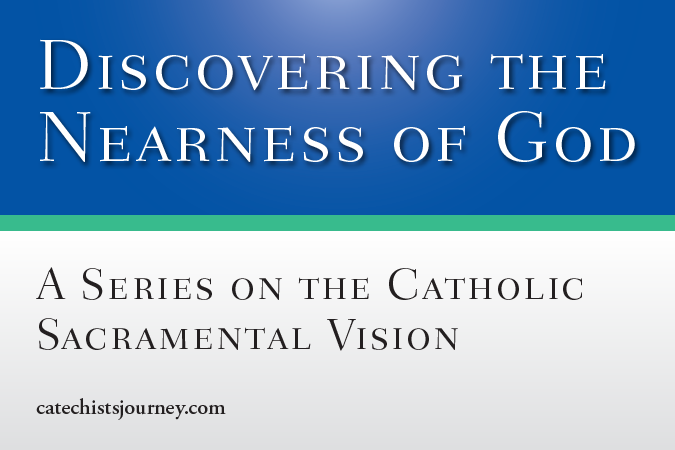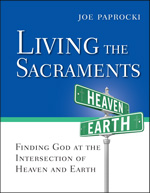
Welcome to the second installment of my series “Discovering the Nearness of God: An Eight-Week Series on the Catholic Sacramental Vision.” This week we will explore the Sacrament of Baptism, with the theme of “A Whole New You.”
In some traditions (Celtic spirituality, for example), certain locations have been identified as spaces where God’s presence is heightened and therefore more easily encountered. These spaces are referred to as “thin spaces,” referring to the belief that God’s presence is normally veiled from human awareness except for certain places where that veil seems to be quite thin. Such thin spaces are usually majestic vistas of natural scenery: mountains, canyons, waterfalls, forests, rivers, oceans, and so on. In my upcoming book, Living the Sacraments: Finding God at the Intersection of Heaven and Earth (Loyola Press), I propose thinking of the sacraments as “thin moments.”
These thin moments are when we recognize that we are metaphorically standing at the intersection of heaven and earth—not a physical location but a reality in which God’s presence oozes forth, coating every aspect of our human existence with divine residue. For Christians, Jesus Christ himself is the intersection of heaven and earth—the marriage of divinity and humanity. Jesus is the Sacrament of God, the tangible embodiment of the intangible God. Jesus, in turn, has given his followers tangible signs of his own intangible presence. He’s given us the sacraments: those thin moments when we find ourselves encountering and keenly aware of the divine presence, which rescues, restores, and reassures us.
This narrative of rescue, restoration, and reassurance begins for us with the Sacrament of Baptism. At the heart of the Christian narrative is the belief that, powerless to free ourselves, we are totally reliant on the intervention of God’s mercy and grace to save us from the destructive and oppressive power of sin. We cannot just declare our freedom from sin—that victory can only be achieved by God, who did so through his Son, Jesus Christ. The day we entered the waters of Baptism is the day of our liberation and a day to be recalled, cherished, and responded to with deep gratitude.
African Americans celebrate “Juneteenth” (June 19), recalling the day in 1865 when word of the Emancipation Proclamation finally reached the Deep South, a full two and a half years after President Lincoln issued the executive order. To this day, African Americans celebrate Juneteenth to recall that glorious day when, at long last, they had a new narrative: one that was characterized not by the bondage of slavery but by the glorious freedom that is the inherent right of all human beings. In much the same way, we recall and celebrate the day of our Baptism, the day of our liberation from a different kind of slavery: the power and dysfunction of sin. According to St. Paul, we who were once slaves of sin have been set free (Romans 6:16–22).
The liberation we experience in Baptism, however, is not magical. Rather, like a participant in a 12-step program, it sets us on the correct path, surrounds us with the help we need to resist temptation and to avoid stinking thinking, provides us with healthy alternatives, and requires that we regularly attend meetings (the celebration of the Eucharist) that will enable us to successfully work the program for the remainder of our lives in order to safeguard the freedom that enables us to become a new creation: a whole new you.
Through the simple yet profound ritual of Baptism, we are introduced to a relationship of love that will sustain us for the rest of our lives. Our work, however, is just beginning. Our access to God’s grace must be followed by the hard work of recognizing it, integrating it into our lives, and learning how to use it for the good of ourselves and others.




Be the first to comment